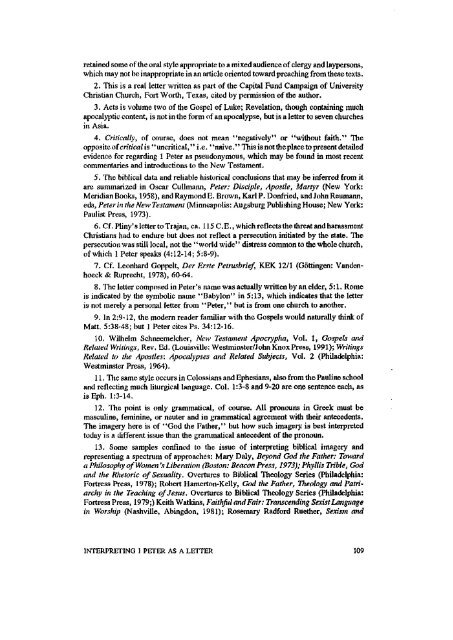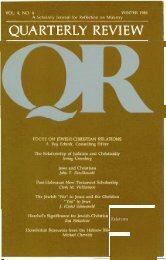TJieodore W. Jennings, Jr. The Meaning of ... - Quarterly Review
TJieodore W. Jennings, Jr. The Meaning of ... - Quarterly Review
TJieodore W. Jennings, Jr. The Meaning of ... - Quarterly Review
You also want an ePaper? Increase the reach of your titles
YUMPU automatically turns print PDFs into web optimized ePapers that Google loves.
etained some <strong>of</strong> the oral style appropriate to a mixed audience <strong>of</strong> clergy and laypersons,<br />
which may not be inappropriate in an article oriented toward preaching from these texts.<br />
2. This is a real letter written as part <strong>of</strong> the Capital Fund Campaign <strong>of</strong> University<br />
Christian Church, Fort Worth, Texas, cited by permission <strong>of</strong> the author.<br />
3. Acts is volume two <strong>of</strong> the Gospel <strong>of</strong> Luke; Revelation, though containing much<br />
apocalyptic content, is not in the form <strong>of</strong> an apocalypse, but is a letter to seven churches<br />
in Asia.<br />
4. Critically, <strong>of</strong> course, does not mean "negatively" or "without faith.*' <strong>The</strong><br />
opposite <strong>of</strong> critical is "uncritical," i.e. "naive." This is not the place to present detailed<br />
evidence for regarding 1 Peter as pseudonymous, which may be found in most recent<br />
commentaries and introductions to the New Testament.<br />
5. <strong>The</strong> biblical data and reliable historical conclusions that may be inferred from it<br />
are summarized in Oscar Cullmann, Peter; Disciple, Apostle, Martyr (New York:<br />
Meridian Books, 1958), and Raymond E. Brown, Karl P. Donfried, and John Reumann,<br />
eds, Peter in the New Testament (Minneapolis: Augsburg Publishing House; New York:<br />
Paulist Press, 1973).<br />
6. Cf. Pliny's letter to Trajan, ca. 115 C.E., which reflects the threat and harassment<br />
Christians had to endure but does not reflect a persecution initiated by the state. <strong>The</strong><br />
persecution was still local, not the "world wide" distress common to the whole church,<br />
<strong>of</strong> which 1 Peter speaks (4:12-14; 5:8-9).<br />
7. Cf. Leonhard Goppelt, Der Erste Petrusbrief, KEK 12/1 (Gottingen: Vandenhoeck<br />
& Ruprecht, 1978), 60-64.<br />
8. <strong>The</strong> letter composed in Peter's name was actually written by an elder, 5:1. Rome<br />
is indicated by the symbolic name "Babylon" in 5:13, which indicates that the letter<br />
is not merely a personal letter from "Peter," but is from one church to another.<br />
9. In 2:9-12, the modern reader familiar with the Gospels would naturally think <strong>of</strong><br />
Matt. 5:38-48; but 1 Peter cites Ps. 34:12-16.<br />
10. Wilhelm Schneemelcher, New Testament Apocrypha, Vol. 1, Gospels and<br />
Related Writings, Rev, Ed. (Louisville: Westminster/John KnoxPress, 1991); Writings<br />
Related to the Apostles: Apocalypses and Related Subjects, Vol. 2 (Philadelphia:<br />
Westminster Press, 1964).<br />
11. <strong>The</strong> same style occurs in Colossians and Ephesians, also from the Pauline school<br />
and reflecting much liturgical language. Col. 1:3-8 and 9-20 are one sentence each, as<br />
is Eph. 1:3-14.<br />
12. <strong>The</strong> point is only grammatical, <strong>of</strong> course. All pronouns in Greek must be<br />
masculine, feminine, or neuter and in grammatical agreement with their antecedents.<br />
<strong>The</strong> imagery here is <strong>of</strong> "God the Father," but how such imagery, is best interpreted<br />
today is a different issue than the grammatical antecedent <strong>of</strong> the pronoun.<br />
13. Some samples confined to the issue <strong>of</strong> interpreting biblical imagery and<br />
representing a spectrum <strong>of</strong> approaches: Mary Daly, Beyond God the Father: Toward<br />
a Philosophy <strong>of</strong> Women's Liberation (Boston: Beacon Press, 1973); Phyllis Trible, God<br />
and the Rhetoric <strong>of</strong> Sexuality. Overtures to Biblical <strong>The</strong>ology Series (Philadelphia:<br />
Fortress Press, 1978); Robert Hamerton-Kelly, God the Father, <strong>The</strong>ology and Patriarclvy<br />
in the TeacMng <strong>of</strong> Jesus. Overtures to Biblical <strong>The</strong>ology Series (Philadelphia:<br />
Fortress Press, 1979;) Keith Watkins, Faithful and Fair: Transcending Sexist Language<br />
in Worship (Nashville, Abingdon, 1981); Rosemary Radford Ruether, Sexism and<br />
INTERPRETING 1 PETER AS A LETTER 109












